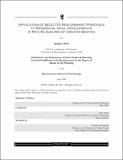Application of selected new urbanist principles to residential infill developments in mature suburbs of Greater Boston
Author(s)
Port, Andrew, 1977-
DownloadFull printable version (18.26Mb)
Other Contributors
Massachusetts Institute of Technology. Dept. of Urban Studies and Planning.
Advisor
Terry Szold.
Terms of use
Metadata
Show full item recordAbstract
The New Urbanist movement has grown considerably in the past decade in response to the impacts of sprawl in the United States. The crisis of sprawl has been caused in large part by poorly crafted land use regulations, many of which mandate sprawl. While an abundance of contemporary land use and planning literature focuses on the concepts of New Urbanism, little attention has been given to their regulatory implementation. And while developers and architects have responded to the problems of sprawl with plans for the development of new communities, few have looked at the opportunity to retrofit existing suburbs. This research adds to the field by illustrating how selected New Urbanist principles can be viably applied to residential infill developments in mature suburbs (specifically Greater Boston) if alternative regulations are adopted. Such development will not only preserve natural resources at the urban edge, but will ensure the efficiency and vitality of our mature core communities. Four developments in communities' representative of the Greater Boston region illustrate the contemporary (conventional) form of residential infill and two are given a post-mortem design alternative (New Urbanist). These alternative developments illustrate the viability of applying New Urbanist principles to residential infill in mature suburbs of Greater Boston. A model hamlet development regulation, used as a guide in developing the alternative designs, illustrates that: (cont.) 1. The application of New Urbanist principles to residential infill is a viable alternative to conventional sprawl development at the fringe of our mature communities; and 2. No drastic paradigm shift is necessary to implement the principles of New Urbanism in infill residential development. Even small changes to local land use regulations can afford significant improvements to the sustainability of our local land use regulations. The framework and results of this research are transferable to cities and towns across the Commonwealth and our nation. It is my hope that the principles and recommendations herein will be applied accordingly.
Description
Thesis (M.C.P.)--Massachusetts Institute of Technology, Dept. of Urban Studies and Planning, 2004. Includes bibliographical references (leaves 91-95). This electronic version was submitted by the student author. The certified thesis is available in the Institute Archives and Special Collections.
Date issued
2004Department
Massachusetts Institute of Technology. Department of Urban Studies and PlanningPublisher
Massachusetts Institute of Technology
Keywords
Urban Studies and Planning.